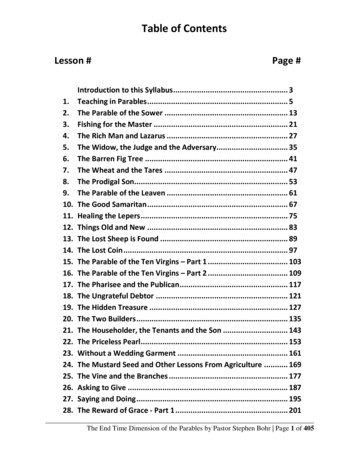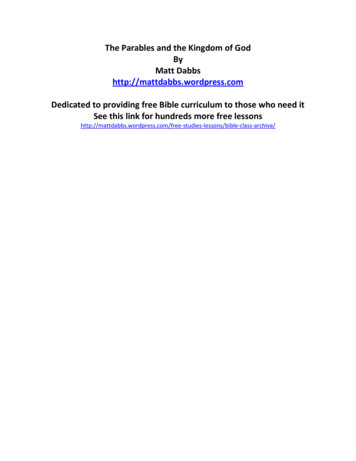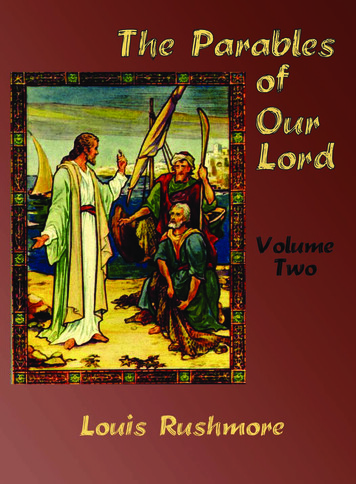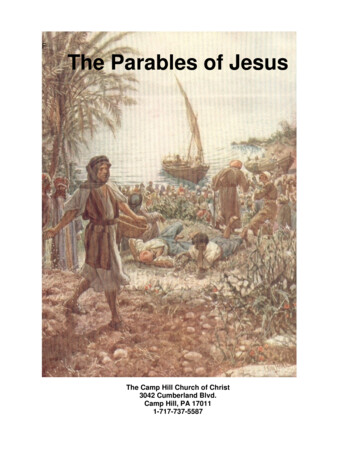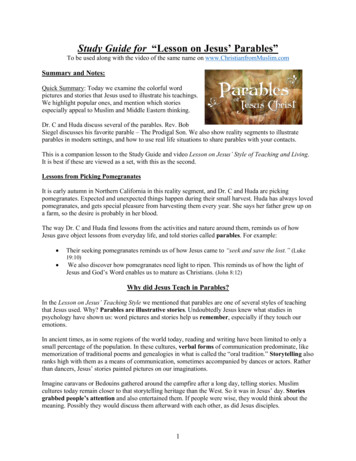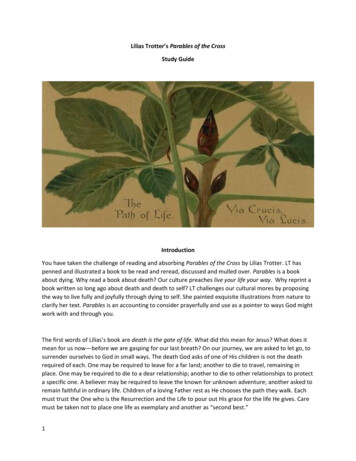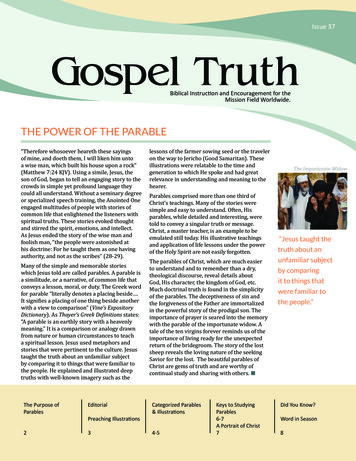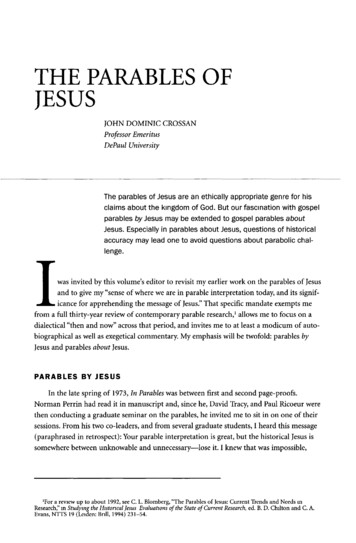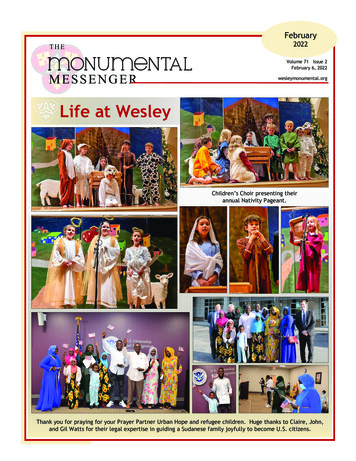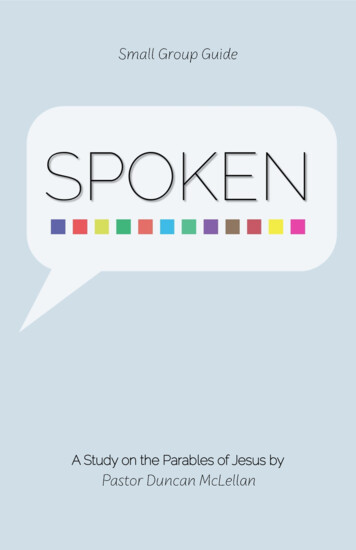
Transcription
A Study on the Parables of Jesus by1
Welcome to the Fall Small Group Series: Spoken! I hopethat this weekly study on the Parables of Jesus is beneficial foryou in your faith, as you grow in your understanding of theteachings of Jesus; that the study of the teachings of Jesus willbring your small group closer together in Christian fellowship;and that the Holy Spirit will continue his process of sanctifyingyou through the study of God’s Holy Word.Jesus often taught in parables. Even those who deny theinspiration and inerrancy of Scripture would agree that Jesustaught in parables. When we read the parables, we are readingthe words our Savior spoke as he taught his disciples. A groupstudy of the parables also lends itself to a vibrant discussion, aswe wrestle with what the parable means and how we can applyit to our lives today.The Small Group study of the Parables of Jesus will sync up withthe weekly sermon text. For each parable, I’ll provide somegeneral comments (which may or may not be useful to sparkgroup discussion) and then provide some discussion questions ifyou are studying the parable before the sermon and somediscussion questions if you are studying the parable after thesermon.If you are looking for some supplemental reading to help yourstudy of the parables, my library is at your disposal. If you arelooking to add material about the parables of Jesus to yourlibrary, I would recommend any of the commentaries onMatthew, Mark and Luke from the Concordia Commentary Series2
and the commentaries on Matthew, Mark and Luke from theNew International Commentary on the New Testament. If youare looking for books on the parables of Jesus from a differenttheological stance, “Many Things in Parables” by Charles Hedrick,and “What Are They Saying About the Parables? By David Gowlerare two that have challenged me.I’ve heard it said that parables are “Earthly Stories with HeavenlyMeanings.” I’m not sure I understand what this means. (I’m notsure those who say that’s what parables are do either). A better,but less catchy way of defining what parables are is to sharethree characteristics all parables share.See, much less catchy!Now that you have an idea of where we are going, let’s begin thisstudy with a word of prayer.3
THE SOWERSERMON DATE: September 5SERMON TEXT: Luke 8:4-15INTROFound in each of thetheParable of the Sower is a parable that Jesusinterprets (the only other one he interprets isthe Parable of the Weeds, which we will lookat next week). And, by interpreting his ownparable for us, Jesus shows how to interpret(or make sense of) the other parables he willgive. Jesus shows us that, in his parables,things represent other things. One friendlyword of advice, be careful when you interpretthis parable not to let your interpretationspeak to matters Jesus did not intend. Forexample, I’ve heard interpretations of thisparable that focus on predestination/free-will.While this area is important, it’s not the focusof the parable; the focus of the parable is toexplain why the preaching/teaching of thekingdom of God does not have the same effecton all people.If you’re looking for an extra challenge, do acareful comparison between Matthew’s(13:1-9), Mark’s (4:1-9), and Luke’s recordingof the Parable of the Sower, and Jesus’accompanying teaching on the purpose of theparables.4
1. In your (or your group’s) own words, describe the categories of soilon which the sower sows seed.2. Is there anything peculiar about the sowing practices of the sower?(In other words, if you were a sower, would you sow seed in thesame manner as the sower? Why or why not?)3. What do the sowing practices say about the character of the sower?4. What is the main teaching of this parable?1. In what ways can you safeguard against being the kind of soil thatdoes not allow the seed of the word of God to produce fruit?2. What are some ways you, your small group, and our congregationcould do a better job of recklessly sowing the seed of the word ofGod?3. Describe experiences you’ve had when God has used you to sow theseed of the word of God. Where were your expectations exceeded(think: a hundredfold yield)?4. What is the main teaching of this parable?5
THE WEEDSSERMON DATE: September 12SERMON TEXT: Matthew 13:24-30INTROAs tempting as it is to try to make a connectionbetween the Parable of the Sower and theParable of the Weeds, I think it is best to leteach parable stand on its own. Yes, there is asower. Yes, there is growth—and the soil withweeds in it does sound similar to one of theplaces the seed is sown in the Parable of theSower. But, as you will see, the Parable of theWeeds refers to the final judgment whereasthe Parable of the Sower refers to the growthof the kingdom of God this side of the. After reading the parable, go aheadand jump down to Matthew 13:36-43 forJesus’ interpretation of the parable.6
1. Why do you think the servants of the Master wanted to pull theweeds right away?2. Why do you think the Master allowed for the weeds and wheat togrow together until harvest time?3. Notice that the final judgment/ salvation takes place at one time andfor all; the “end of the age.” How does this help our understandingof what salvation is and what happens to us when we die?4. Where else does Jesus use the expression, “weeping and gnashing ofteeth”? What is the context where it is used?1. How do some people misuse this parable to argue for “doublepredestination”?2. Of the four different “views of hell,” which one do you think is right(or closest to being right): literal, figurative, annihilation, orpurgatorial?3. What are some examples in your life of the struggles of living wheatamong weeds?4. In the parable, it is the Son of Man who does the sowing. In whatways is sowing-kingdom-seed done today?7
THE RICH FOOLSERMON DATE: September 19SERMON TEXT: Luke 12:13-21INTROI believe this is the only time God appears (byname) in a parable. And this raises a difficultquestion: if things represent other things inparables, who (or what) does God represent?(Or: does everything in a parable alwaysrepresent something else?) Anyway, the mainteaching here is given by Jesus before theparable begins: a person’s life does not consistin the abundance of their possessions. And,being rich toward God is wise; it is foolish tobe rich toward yourself.8
1. The text begins with a brother asking Jesus to get his brother todivide an inheritance between the two of them. Of all the things hecould have asked Jesus to do, he chose this! What would have beensome better things for him to ask Jesus to do for him?2. How can we be on our guard against all covetousness?3. Jesus says a person’s life does not consist in the abundance of theirpossessions. (The Greek for “consist” can mean “to begin” or “comeforth from”). What does (or should) a person’s life “consist” of?4. What should (or could) the rich man have done differently?1. What is the context (the passages before and after the parable) ofthe parable? (Bonus question: how does context help with yourunderstanding of the parable?)2. Can you identify some areas in your life where you are “buildingbigger barns”?3. Why do you think Luther thought it was wise to have twocommandments deal exclusively with coveting?4. How would heeding Jesus’ warning in this parable help you to standout from the culture and world around us?9
THE BARREN FIG TREESERMON DATE: September 26SERMON TEXT: Luke 13:6-9INTROIn order to figure out the meaning of theParable of the Barren Fig Tree, we have to leanheavily on the passage that comes before it,where Jesus teaches that the apparentindiscriminate and untimely deaths of“innocent” people highlight the need to repentright now today! The Parable of the Barren FigTree highlights the mercy of God (who givesmore time for people to repent) as well as theneed to repent (the fig tree is not bearing fruitand will be cut down unless somethingchanges right now today). The follower ofJesus should see in this parable the constantreminder to repent right now today wheneverand wherever sin creeps into their life, as wellas the dire need those outside of Christ haveto hear the gospel and the call to repentanceand new life right now today.10
1. (Luke 13:1-5.) What is Jesus teaching us in his answer to those who“told him about the Galileans whose blood Pilate had mingled withtheir sacrifices” and his comments about the Tower of Siloam, whokilled eighteen people when it collapsed?2. Fig trees don’t bear fruit right after being planted. In fact, it can takeup to 5 years for them to produce fruit. What problem does the figtree have, if the master expects fruit on it in years 3 and 4? (And yes,with that little tidbit of information, the interpretation of the parablejust got a bit more difficult; hang in there!)3. Do you think the fig tree bore fruit next year, or was it cut down?4. A simple reading of the text invites us to see ourselves as a fruitlessfig tree that needs to bear fruit before the master comes around nextseason. But a more thoughtful reading of the text leads us to seeourselves as a fig tree that is unable to bear fruit before the masterreturns. How does this reading of the text push back against worksrighteousness and leave our salvation entirely in God’s hands?11
THE WEDDING FEASTSERMON DATE: October 3SERMON TEXT: Luke 14:7-11INTROIt’s a good thing Luke tells us that this is aparable because, of all the parables, this onereads the most like something that is not aparable. But, through this parable, Jesus isgiving us more than Christ-like etiquette fordinner parties; he is teaching about the lowbecoming high and the high becoming low.Jesus speaks specifically about “the one” whohumbles himself who will be exalted. (Sorrythis introduction is short; this parable is,IMHO, one of the more simple, both in how itreads and what it means.)12
1. Describe a time in your life you were humiliated in front of a group ofpeople.2. Describe a time in your life when you were raised up, exalted, orhonored in front of a group of people.3. What is the most humiliating (humanly speaking) event in the life ofJesus?4. What is Luke teaching us about this most-humiliating-event in the lifeof Jesus? How can we see it as an example of the low being madehigh, or exalted?1. What would it look like if a barely-made-the-guest-list guest plunkedthemselves down at the head table in the seat reserved for the brideor groom?2. What are some examples of when people over-exalt themselveswhen, instead of being full of pride, they should be humble?3. Who is the “he” (singular!) who humbles himself?4. In what ways can we avoid being like the guest at the wedding feastwho knowingly or unknowingly exalts himself in an embarrassingway? (Hint: it is connected to your answer to #3.)13
THE GREAT BANQUETSERMON DATE: October 10SERMON TEXT: Luke 14:12-24INTROLast week, we had a short introduction to theparable. This week, you get a long one!The first question we have to ask is: is thisreally a parable? In the Gospel of Lukewhenever Jesus gives a parable, the narratorlets us know, saying something like, “and hegave them a parable.” Now, sometimes,parables are stacked one after another, withonly one, “and he gave them a parable”preceding them. The question for us is, howmuch time is allowed to pass between the endof one parable and the start of anotherteaching of Jesus before we can no longerconsider the second teaching of Jesus aparable? (Just give us the answer, Pastor.) Ithink it’s a parable. The parable is about“unworthy” people being invited to attend agreat banquet. Pay careful attention to theexcuses they give for not attending. (Watchingthe grass grow, taking animals to the vet, andenjoying life as newlyweds.) The point is thatGod has invited everyone to the banquet of hiskingdom (his rule and reign on earth throughthe person and work of Jesus); no one is worthy of the invitation, yet theunworthy make lame excuses for not entering his banquet (living life underhis gracious reign through a relationship with Jesus). The end result is thatthey are prohibited from enjoying what they were invited to attend. Thispoints forward to the end-time judgment and the new restored creation.Those who have rejected the kingdom when it came to them in this age willbe unable to enjoy it in the age to come.14
1. Let’s look at the context! Try to imagine what it would be like if theman who had invited Jesus to his party did what Jesus told him to doin 14:12-13.2. Let’s (continue to) look at the context! In what way (or ways) doesthe man who exclaims, “Blessed is everyone who will eat bread in thekingdom of God!” not know what he is talking about? (Hint: where isthe kingdom (or reign) of God happening when Jesus is around?)3. In parables, things represent other things. What does the call tocome to the banquet in 14:17 represent?4. In parables, things represent other things. What do the excuses thepeople who were invited to come to the banquet make represent?1. How does God invite people to the “banquet” today?2. What are some of the reasons people give for turning down theinvitation to the “banquet”?3. Jesus uses “banquet” or party language frequently to refer to thekingdom of God. How can we reflect this understanding of ourconnection to Christ and our life in him in how we worship, pray, andlive?4. Why does the master of the house become angry? (Who is themaster of the house angry with? Why?)15
THE LOST SHEEP & COINSERMON DATE: October 17SERMON TEXT: Luke se parables easily get misunderstood tomean that we need to search for the kingdomof God like a woman searching for a lost coin,or a man searching for a lost sheep. In doingso, we head off into the darkness of worksrighteousness. Instead, it is better to see theparables teaching about the character andactions of our God, who has searched for uslike a man searching for a lost sheep or awoman for a lost coin. Our God movedheaven and earth to find us and make us hisown. Not only that, but he rejoices muchmore than we would expect when he finds us.16
1. Compare the Parable of the Lost Sheep here in Luke to the parallelpassage in Matthew (18:10-14), paying careful attention to Matthew18:12 and Luke 15:4. What do you make of the additional phraseLuke has in his parable?2. What does it mean to “repent?” (Hint: the Greek word for ‘repent’in the parables here is: μετανοέω.)3. Parables often contain exaggerations. What is (or are) theexaggeration(s) in the two parables?4. Why do you think the man lays the sheep on his shoulders for thewalk home? In what ways does this correspond to how the Lordtreats us after we have been found?17
THE LOST SONSERMON DATE: October 24SERMON TEXT: Luke 15:11-32INTROThe Parable of the Prodigal Son (or, because itcomes after parables about lost sheep andcoins, the Lost Son), is a favorite of many!There’s a lot going on in this parable; andseveral different plot lines and characterdevelopments. There’s the father, who givesgenerously to both of his sons. There is theyounger son, who returns home in shame, onlyto have his father celebrate his return. Andthere is the older son, who defines hisrelationship with his father in terms of serviceand obedience, who ends up on the outsidelooking in. Which person, which plot line, isthe most important? Depends, I suppose, onwho you can relate to the most. But there issomething in this parable for everyone. Andthe message is clear: the son who was lost isfound, the one who was “dead” is now “aliveagain.” Music in the ear of every sinner, and ahope-filled look at what our relationship withGod is and will be!18
1. It was not uncommon for parents to give the inheritance to theirchildren before they passed. But instead of using the inheritance forproviding for his family, the younger son takes it and heads out topleasure himself. What are some of the drawbacks of living in a culturethat expects its elderly to provide for themselves and for children toseparate themselves financially from their parents?2. The younger son plans what he is going to say upon his return home.Does he get through all of this script? What happens while he isreciting his script to his father?3. Where is the older son when the younger son returns home? Are youmore likely to find a son or a servant doing what the older son wasdoing when the younger son returned home?4. Who is the main character in the parable?1. What is the refrain repeated by the father about the return of his son?2. Why must the household celebrate?3. The older son must ask one of the household slaves what his father isup to—why all the goings on when his brother returns. What does thissay about the older son’s relationship with his father?4. At the end of the parable, where is the older brother? Where is theyounger brother? How does this connect the Parable of the Lost Sonwith the two preceding parables (the Lost Sheep and Lost Coin)?19
THE DISHONEST MANAGERSERMON DATE: October 31SERMON TEXT: Luke 16:1-13INTROOne of the more difficult parables tounderstand is this one, the Parable of the (socalled!) Dishonest Manager. A mid-levelmanager finds out he is about to be fired. Hehas no other skills other than being a mid-levelmanager. So what does he do? Answer:anything he can to give himself a soft landingwhen the hammer drops and he loses his job.The question raised by this parable is: sincepeople would be willing to bend and break therules to gain worldly wealth, what should thechildren of God be willing to bend and break toadvance the kingdom of God? The answer, ofcourse, is any and everything. This is a parablethat should get us to consider what we arewilling to do to advance God’s kingdom, and ifwe are holding onto things that we areunwilling to risk for the sake of the gospel.20
1. What would you do if you found out you were about to lose yourjob?2. The man technically did what was in his power to do (reduce thedebts owed to his master). If you could rename the parable, whatwould you call it (other than the “Parable of the DishonestManager”)?3. In what ways are those outside of a relationship with Christ moreshrewd than those who have a relationship with Christ? (v. 8)4. What are some ways the church could be more “shrewd” in dealingwith those who do not know Christ?1. What are some ways we can be more faithful in the “verylittle” (v.10) that we as individual Christians, families, and the churchhave been given?2. In what ways can money take the place of God in peoples’ lives?3. Scripture warns more about the dangers of being rich than beingpoor. This flies in the face of the world around us, that sees wealthand privilege and not responsibility. What are some other ways weunderstand material wealth differently than those outside of arelationship with Christ? (Hint: what is wealth to be used for, whatshould we be willing to do to acquire wealth, etc.)4. Take time to pray for those who have been given the responsibility ofworldly wealth.21
THE HIDDEN TREASURE,PEARL OF GREAT VALUE,AND THE NETSERMON DATE: November 7SERMON TEXT: Matthew 13:44-50INTROIn the Gospel of Matthew, these threeparables are grouped together (for a reasonthat we’ll explore in the questions). Things arediscovered (not recovered, as in the Parable ofthe Lost Sheep, Coin, and Son—from theGospel of Luke) at great cost to the onediscovering them. And so the question hangsin the air: was it worth all that the man had tobuy the field, the merchant selling all he had tobuy the pearl, and the work of sorting out thegood fish from the bad? The question is leftunanswered, but hinges on what the treasure,pearl, and good fish are—and do theyrepresent the same thing?22
1. Who does the searching and buying and who is the thing beingdiscovered and purchased? How do the first two parables read if weare the pearl and treasure and God is the one selling all he has (thelife of his one and only son) to purchase us?2. How do the first two parables read if we are the ones selling all wehave to take possession of God (the pearl and treasure)?3. Which reading makes the most sense, given our understanding of theGospel of the grace of God and the sacrifice of Christ to save us?4. How can we answer the question: was it smart for God to spend allhe had to make us his own?1. For the third parable in this series, things are a bit different. Who arethe fish and what happens to them?2. What does this separation represent?3. Why do you think that Jesus interprets the last parable but leaves thefirst two uninterpreted?4. Where else does Jesus use the expression “weeping and gnashing ofteeth”? What does it mean here and the other places it is used?23
THE WICKED TENANTSSERMON DATE: November 14SERMON TEXT: Matthew 21:33-46INTROAt first, this parable might appear to be easy tointerpret. The tenants are the residents ofJerusalem. The servants sent to them are theprophets. The son of the owner of thevineyard is Jesus. The vineyard owner is God.But there are several problems with thisinterpretation. First, the residents ofJerusalem do not plan to kill Jesus untilchapter 26; they would not know he wastalking about them if he is the murdered son inthe parable as far back as chapter 22. Second,the one who judges and punishes Jerusalem inthe Gospel of Matthew is Jesus (see chapters24-25), not the Father. Third, the residents ofJerusalem have been complicit in the murderof John the Baptist already (a point thatMatthew, more than any other Gospel, hasgone out of his way to show). So how do youinterpret this parable?24
1. Notice that the owner does all of the work to prepare the vineyard.List out all of the things that he does.2. List out the groups of servants that get sent to collect fruit from thevineyard and what happens to them.3. What is the flaw in the thinking of the tenants in v.38?4. What is the end result of the tenants? Why would the chief priestand Pharisees think Jesus was talking about them?1. What role did John the Baptist (or the Prophet John) play in theGospel of Matthew?2. What could the stone that the builders rejected that has become thecornerstone be?3. What are the fruits that God wants his vineyard to produce (v.43)?4. If Jesus came to your home and to our church today, would he find usproducing kingdom fruit? (The answer is not a straight-up “yes” or“no,” but might get you discussing ways we could be doing better incertain areas, and areas of strength that we can thank God for andcelebrate.)25
THE 10 MINASSERMON DATE: November 21SERMON TEXT: Luke 19:11-27INTROThere are two parallel storylines that runthrough this parable. The first is of the citizensof the kingdom who try to prevent thenobleman from being made king over them;the second is of the stewardship of theservants with the nobleman’s money. The firststoryline ends with the now-king having thecitizens who tried to prevent his coronationslaughtered in front of him. The secondstoryline ends with the faithful servants beingrewarded and the unfaithful being left withnothing. It is one thing to be faithful with whatthe king has entrusted to us, one thing to beunfaithful with what he has entrusted to us,and another thing to oppose the king’s rule.26
1. No reason is given for why the citizens did not want the nobleman tobe made king. What reasons can you think of for why people don’twant to have anything to do with Jesus? How would you answersomeone who says they don’t want to have anything to do withJesus?2. What are some of the “minas” Jesus has left you to be a goodsteward of until he returns?3. Why are Christians reluctant to use the “minas” Jesus has left themwith in service to him? What are some ways we misuse the “minas”Jesus has given to us?4. Do you know anyone you could consider a good steward of what Godhas given them? What makes them a good steward?27
601 EAST SECOND STREET WACONIA MN 952-442-4165TRINITYWACONIA.ORG FACEBOOK.COM/TRINITYWACONIA28
you are studying the parable before the sermon and some discussion questions if you are studying the parable after the sermon. If you are looking for some supplemental reading to help your study of the parables, my library is at your disposal. If you are lo
